On the Heights: News from the School of Public Health

School Launches Online Master of Science Program in Population and Health Sciences
Around the world, we need more access to public health education. Since the successful
launch of the online MPH in Population and Health Sciences two years ago, the University
of Michigan School of Public Health has remained committed to expanding the scope
of its online curricula and will now offer an online Master of Science (MS) in Population and Health Sciences.
Public Health Experts Support State COVID-19 Response
Matthew Boulton, senior associate dean for Global Public Health and professor of Epidemiology and Preventive Medicine, was appointed to the Michigan Coronavirus Task Force on Racial Disparities, created via executive order by Michigan Governor Gretchen Whitmer in April. The task force will study racial disparities amid the impact of COVID-19 and recommend actions to address the reasons behind such disparities.
“The disproportionately higher burden of COVID-related cases and deaths among persons of color in Michigan and elsewhere is yet another wake-up call for our health care system and our nation that it’s time to get serious about addressing the inequalities and gross disparities in health that continue to plague our country,” Boulton said.
Recent data suggests that African Americans, who make up roughly 14 percent of Michigan’s population, account for 40 percent of all COVID-19 deaths in the state. Experts are trying to understand what factors and influences impact these health outcomes.
Read more about how the school is supporting the state’s COVID-19 response. ![]()
Our Miseducation on Climate and Health
Jalonne L. White-Newsome, PhD ’11, visited the University of Michigan in January to deliver the 2020 Health Sciences MLK Lecture titled “The (Mis)Education of US on Climate and Health.”
Dr. White-Newsome’s moving address explored the ways Dr. King’s writings, particularly about education, can guide current public health and climate work and the steps the public health field must take to meaningfully address health disparities, including those rooted in institutional racism and ongoing discrimination.
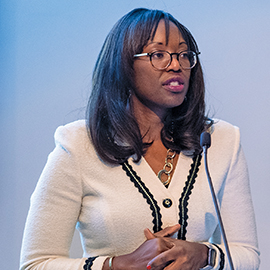
Zimmerman Honored for Public Engagement Efforts with President’s Award
Marc Zimmerman, director of the Prevention Research Center and the Michigan Youth Violence Prevention Center in the School of Public Health, was recognized in March with the President’s Award for Public Impact, which honors individuals whose research and expertise tangibly addresses a major public-sector challenge.
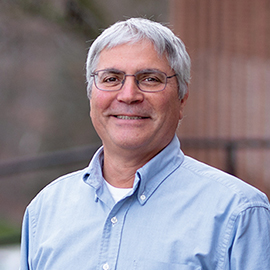 Zimmerman is Marshall H. Becker Collegiate Professor of Public Health and professor
of Health Behavior and Health Education. His research focuses on measuring and analyzing
psychological and community empowerment and how positive factors in adolescents’ lives
help them overcome risks. Much of Zimmerman’s work at Michigan over 31 years has been
in Flint, where he started Youth Empowerment Solutions, leads multiple youth violence
prevention efforts, and helped form the Healthy Flint Research Coordinating Center
to give a voice to community representatives in the water crisis.
Zimmerman is Marshall H. Becker Collegiate Professor of Public Health and professor
of Health Behavior and Health Education. His research focuses on measuring and analyzing
psychological and community empowerment and how positive factors in adolescents’ lives
help them overcome risks. Much of Zimmerman’s work at Michigan over 31 years has been
in Flint, where he started Youth Empowerment Solutions, leads multiple youth violence
prevention efforts, and helped form the Healthy Flint Research Coordinating Center
to give a voice to community representatives in the water crisis.
Zimmerman received nominations from faculty members at the University of Michigan and Michigan State University. “Dr. Zimmerman’s empirical work to help youth overcome adverse childhood experiences and his model of empowerment are widely cited and applied by researchers and practitioners in a variety of sectors globally,” the nomination statement said. “His application of resiliency and empowerment as strategies for change has mobilized a variety of stakeholders in the government and nongovernmental sector.”
Zimmerman expressed how important it is to involve youth in projects that engage them in change. “I have to thank the community partners,” he added. “Their help and collaboration have made all the difference in the world. They taught me a lot about people, academic-community partnerships, equity, inclusion, diversity, and how to think more critically about my work.”
President Mark S. Schlissel noted both the courage and creativity required to confront “some of our society’s most pressing chal-lenges.” Zimmerman’s work “has not only made a difference in tackling the problems them-selves but in finding new and relevant ways to engage the public in finding and understanding possible solutions,” Schlissel said.Crawford Honored with Distinguished Diversity Leader Award
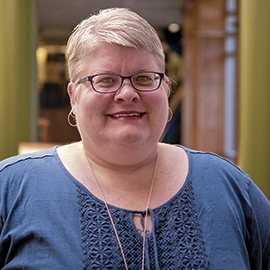 Jenny Crawford, assistant to the chair in the Department of Health Behavior and Health
Education, was recognized for her work building campus community and strengthening the school’s commitment
to diversity, equity, and inclusion with a campus-wide Distinguished Diversity Leader
Award. Crawford serves as the department’s staff representative to the school-wide
DEI committee and is known as an action-oriented colleague who moves initiatives forward
with equal commitment to ideas from faculty, staff, and students. She leads a monthly
book club that discusses diversity-related books and instituted a current-events dialogue
series to provide a community forum for discussing important topics. She organizes
a summer film series on DEI-related topics that is open to the entire school, and
its registration is usually filled within hours.
Jenny Crawford, assistant to the chair in the Department of Health Behavior and Health
Education, was recognized for her work building campus community and strengthening the school’s commitment
to diversity, equity, and inclusion with a campus-wide Distinguished Diversity Leader
Award. Crawford serves as the department’s staff representative to the school-wide
DEI committee and is known as an action-oriented colleague who moves initiatives forward
with equal commitment to ideas from faculty, staff, and students. She leads a monthly
book club that discusses diversity-related books and instituted a current-events dialogue
series to provide a community forum for discussing important topics. She organizes
a summer film series on DEI-related topics that is open to the entire school, and
its registration is usually filled within hours. ![]()
Kardia Named Associate Dean for Education
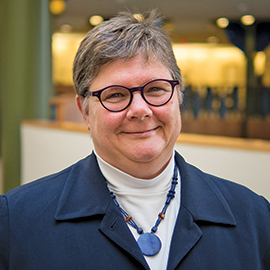 Sharon Kardia, Millicent W. Higgins Collegiate Professor of Epidemiology, has been
named the School of Public Health’s first associate dean for Education. In her new role, Kardia will focus on all aspects of the educational experience—residential
and fully online degrees, student and faculty experiences, curriculum and technology
choices, and how to teach public outreach and engagement. “Staying true to that basic
mission of improving the public’s health will enable us to continue and expand upon
our tradition of creating and sharing vital scientific knowledge and practice,” Kardia
said.
Sharon Kardia, Millicent W. Higgins Collegiate Professor of Epidemiology, has been
named the School of Public Health’s first associate dean for Education. In her new role, Kardia will focus on all aspects of the educational experience—residential
and fully online degrees, student and faculty experiences, curriculum and technology
choices, and how to teach public outreach and engagement. “Staying true to that basic
mission of improving the public’s health will enable us to continue and expand upon
our tradition of creating and sharing vital scientific knowledge and practice,” Kardia
said.
The appointment demonstrates Dean DuBois Bowman’s vision that educating and training new public health professionals is a priority. “As the field of higher education continues to evolve and transform, it’s critical to have an associate dean for Education to support our school in innovating and furthering our world-class programs,” Dean Bowman said. “Dr. Kardia has worked tirelessly to ensure our new online program is delivered on time and in a high-quality manner. She has consistently put in place systems and supports to ensure our faculty can be successful teachers and can embrace new modes of teaching.”
Dean Bowman sees Kardia’s success as a teacher and mentor as a key to the school’s delivery of a best-in-class educational experience: “Dr. Kardia is herself a stellar instructor who consistently receives high marks for her teaching effectiveness, has distinguished herself as an academic innovation trailblazer, and has demonstrated a strong commitment to mentoring master’s and doctoral students.”Anthony Appointed Director of Health Informatics
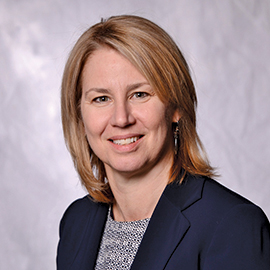 Denise Anthony has been appointed director of the Master of Health Informatics (MHI) degree program at the University
of Michigan. Anthony is a professor of Health Management and Policy in the School
of Public Health and in the Department of Sociology at the University of Michigan.
Denise Anthony has been appointed director of the Master of Health Informatics (MHI) degree program at the University
of Michigan. Anthony is a professor of Health Management and Policy in the School
of Public Health and in the Department of Sociology at the University of Michigan.
The MHI degree is a joint degree of the School of Information, the School of Public Health, and the School of Medicine—a two-year, multi-disciplinary program that prepares professionals to work at the intersection of patient health care, information technology, and data analytics.
"I am thrilled to see Professor Anthony take on this leadership role overseeing the Health Informatics program,” Dean DuBois Bowman said. “I am confident her innovative and impactful research on health care technology and privacy, her commitment to teaching and student success, and her administrative leadership experience will enable her to lead the Health Informatics program to continued success.”
Anthony’s research examines the intersection of information technologies with social relationships and social institutions. She has studied how patients and providers use health information technologies and how new technologies like electronic records and patient portals affect health care quality and equity.
“I am honored and excited to become director of the MHI program,” said Anthony. “MHI students bring a diverse range of skills and experiences to the program and a real desire for understanding not only the data analytics but also the complex issues of health needs and health care practices necessary for health informatics.”
The Michigan MHI program is one of the first in the US, bringing together the multidisciplinary expertise of three schools to address the growing need for health informatics expertise.Boulton Recognized with Collegiate Professorship
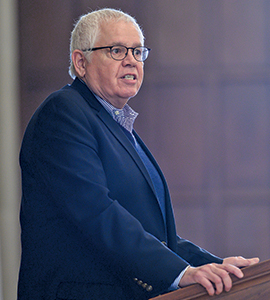 Matthew Boulton, senior associate dean for Global Public Health and professor of Epidemiology
and Preventive Medicine, has been appointed the Pearl L. Kendrick Collegiate Professor of Global Public Health by the University
of Michigan Office of Research. The renewable five-year appointment was approved by
the Board of Regents in March.
Matthew Boulton, senior associate dean for Global Public Health and professor of Epidemiology
and Preventive Medicine, has been appointed the Pearl L. Kendrick Collegiate Professor of Global Public Health by the University
of Michigan Office of Research. The renewable five-year appointment was approved by
the Board of Regents in March.
From his time as state epidemiologist and director of the Bureau of Epidemiology at the Michigan Department of Community Health to his global public health work in academia, Boulton demonstrates an expansive knowledge and passion for public health.
“He is a champion of scientific and medical capacity building around the country and the world.” —Dean F. DuBois Bowman
“Dr. Boulton’s unique career has taken him from public health practice and public service at the county, state, and national levels to multifaceted leadership roles here at the School of Public Health in practice, teaching, global public health, and other capacities,” said Dean DuBois Bowman. “Perhaps most importantly, he is a champion of scientific and medical capacity building around the country and the world. With the designation of collegiate professor, the university has acknowledged Dr. Boulton’s far-reaching impact on the public’s health.”
Faculty honored with a collegiate professor designation are invited to choose the name of a mentor or other scholar who influenced their work. Boulton chose Pearl L. Kendrick, in part, because the work of women scientists, especially from the pre-WWII era, “has often been discounted or underappreciated, and this is certainly true of Kendrick,” he said. “She was a pioneer in vaccine development and in the conduct of vaccine field trials and is grossly under-recognized for her contributions. In fact, Kendrick helped establish the first international standards for vaccine production. I hope keeping Kendrick’s name and legacy in mind is a step toward honoring the many women scientists who have changed our world and contributed importantly to public health.”School Receives Funding for NIH Minority Health and Health Disparities Research Training Program
The University of Michigan School of Public Health has received a grant to fund the NIH Minority Health and Health Disparities Research Training (MHRT) Program for five years. MHRT provides students from underrepresented backgrounds with the opportunity to engage in research overseas on issues related to health disparities.
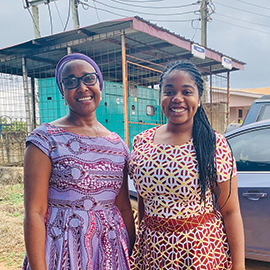
The funding provides support for eight to twelve students a year and is open to graduate students in health-related units from around the country. To qualify for MHRT, students must be from a group underrepresented in biomedical, behavioral, clinical, and social sciences. This includes members of racial and ethnic groups that have been identified to be underrepresented and those from rural areas or areas facing socio-economic challenges.
“Underrepresented groups often don’t see themselves in these types of research roles,” said Chinyere Neale, director of programs for Global Public Health. “This program helps address the need for people who are doing global research to match the demographics of the US population and more closely relate to the country in which they are conducting research.”
The program’s central goals are to build research skills and provide students with new tools for conducting original research and making unique scholarly contributions.School Welcomes New Chief Development Officer
In June, Tony Wagener joined Michigan Public Health as chief development officer to lead our fundraising and alumni engagement efforts. Wagener comes from the University of Michigan Ford School of Public Policy, where he served as senior major gifts officer. Prior to joining the University of Michigan, he was senior director of development at Bowling Green State University within the colleges of Arts and Sciences and Musical Arts. Wagener is dedicated to working with alumni and donors in using their resources to impact the world.
Four Faculty Named Professors of Global Public Health
The University of Michigan Board of Regents approved a new cohort of professors of Global Public Health for a three-year term: K. Rivet Amico (Health Behavior and Health Education), Aubree Gordon (Epidemiology), Andrew Jones (Nutritional Sciences), Marie O’Neill (Environmental Health Sciences and Epidemiology).
- Interested in public health? Learn more today.
- Read more about news about Michigan Public Health.
- Support research at Michigan Public Health.
Tags
- Epidemiology
- Spring 2020
- Advocacy
- COVID-19
- Community Partnership
- Diversity Equity and Inclusion
- Engaged Learning
- Environmental Health
- Flint
- Global Public Health
- Health Care Access
- Health Care Management
- Health Care Policy
- Health Equity
- Health Informatics
- Infectious Disease
- Michigan
- Professional Development
- Research
- Teaching
- Vaccines
- What Is Public Health?
